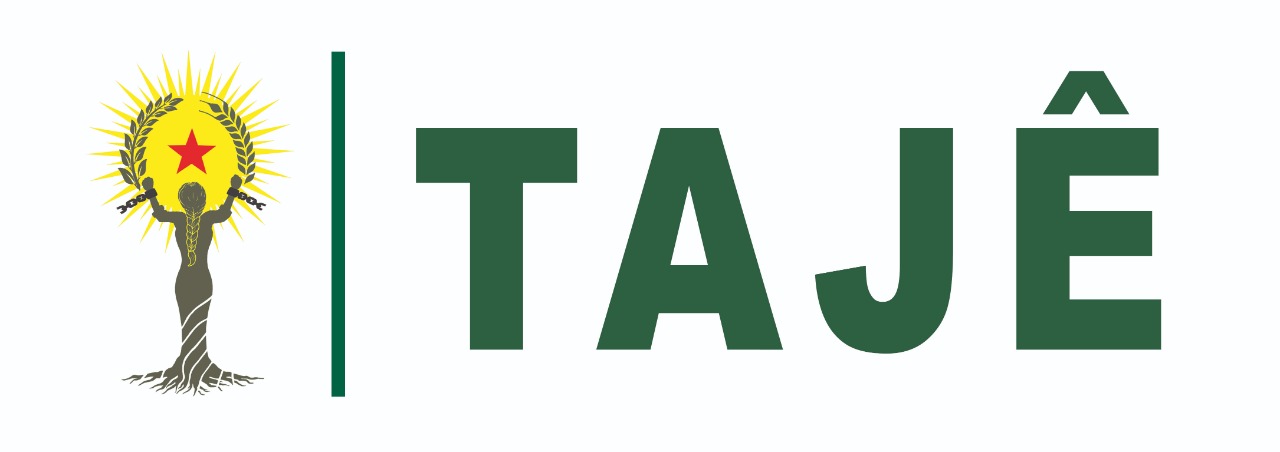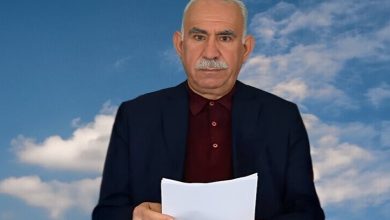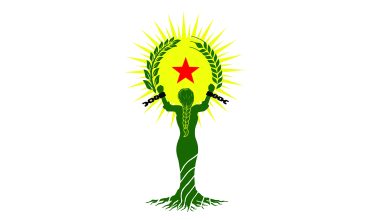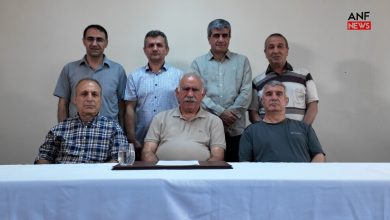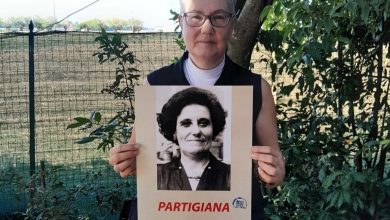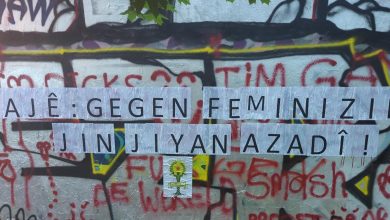European Parliament hosts Yazidi women conference titled “Shengal / Sinjar – A society threatened by genocide – reconstruction as a guarantee for peace in the Middle East”.
On January 30th, 2024 a conference of Yazidi women took part in the European Parliament in Brussels. The conference was titled “Shengal / Sinjar – A society threatened by genocide – reconstruction as a guarantee for peace in the Middle East”. The conference was organized by the umbrella organization of the Yazidi Women's Councils (SMJÊ) in cooperation with the Yazidi Associations in Germany. Also two women from Shengal, Siham Dahkeel Rasho, spokesperson of the diplomacy committee TAJE, and Suad Murad Khalaf (Hêza), Commander of YJS, participated in the conference.
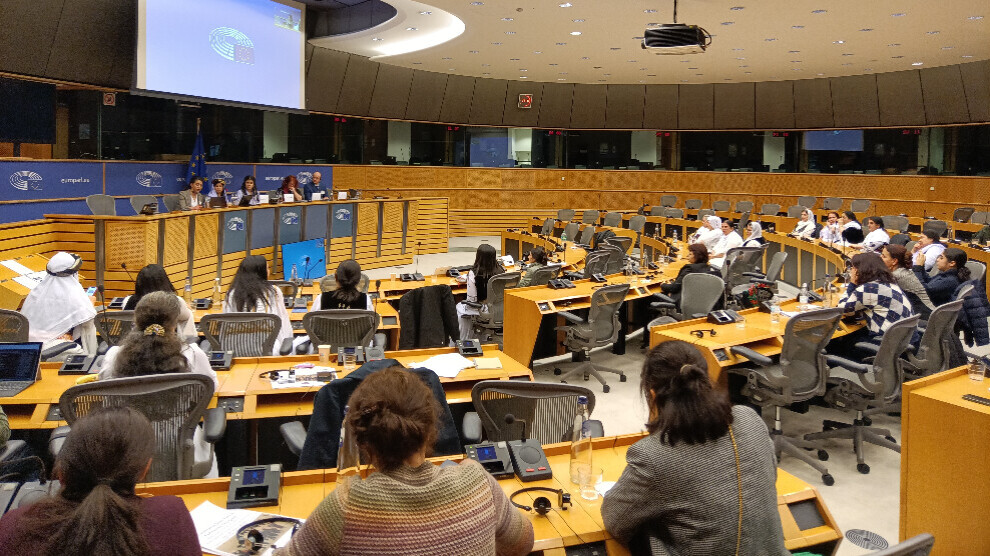
The umbrella organization of the Yazidi Women’s Councils (SMJÊ) wrote about the conference: “In the Middle East, especially in the Yazidi settlement area of Shengal, the 74th massacre of Yazidi society, especially Yazidi women, by the so-called ‘Islamic State’ took place on 3 August 2014. Through the ongoing struggle and resistance of Yazidi people over the last decade, the threat posed by the Islamic State gangs has been successfully defeated, and many enslaved women and children have been freed from their hands. The Yazidi people have independently established their self-government together with other peoples in the region and have begun to rebuild the region that was destroyed by the war. (…) To make the Shengal region a safe place, concrete steps are required from the international community. In particular, the following questions must be answered: 1. What humanitarian obligations arise for the states that have recognized the genocide of the Yazidi people? 2. What methods should be used to rebuild Shengal, and what role would official recognition of Shengal’s self-government play in the rest of the region? These questions will be discussed at the conference “Shengal – A Society at Risk of Genocide – Reconstruction as a Guarantee of Peace in the Middle East” on 30 January 2024 at the European Parliament in Brussels. The conference offers the opportunity to take a current and forward-looking look at the situation. The questions mentioned will be examined intensively in collaboration with speakers and experts from science and politics.”
Program:
09:00 – 09:05 Opening – Moderation: Ayfer Özdogan
09:05 – 09:15 Opening speech by the umbrella organization of the Yezidi Women’s Councils: SMJÊ spokeswoman Nûjiyan Günay
09:15 – 10:15 Greetings:
- Karsten Lucke, S&D Group, coordinator of the DEVE Committee
- Katrin Langensiepen, MEP / Greens EFA
- Lorena Lopez de Lacalle, Chairwoman of the European Free Alliance
- Özlem Demirel, MEP The Left Group in the European Parliament – GUE / NGL
- Mary Collins, Secretary EWL
10:15 – 12:30 First session – Moderation: Feleknas Uca / Recognition of the genocide and the resulting consequences and obligations
- Suad Murad Khalaf (Hêza), contemporary witness of the 74th genocide of the Yazidis: women’s liberation and self-defense
- Rojda Arslan (LL.M.), lawyer and consultant for international criminal law and human rights: recognition of genocide under international law and at the political level
- Dr. Leyla Ferman, political scientist: Relationship between legal processing and justice
- Marion Böker, Director of Advice for Human Rights and Gender Issues: War Crimes Against Women and International Responsibility
12:30 – 3:00 p.m. lunch break
3:00 p.m. – 5:30 p.m. Second session – Moderation: Shilan Badal Kheder / Prospects for further reconstruction and recognition of Shengal’s self-government
- Siham Dahkeel Rasho: Contemporary witness to the 74th genocide of the Ezidis: women’s self-organization and future prospects
- Dr. Rassmann, scientist and journalist: Sinjar – A so-called disputed region
- Dr. Mechthild Exo: The democratic nation as a future model and solution for Shengal and the region
5:30 p.m. – 6:00 p.m. Closing statement
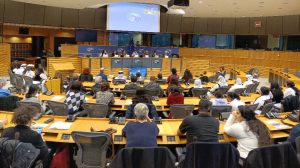
Shilan Badal Kheder moderated the opening session of the conference. She gave information about the content and purpose of the conference and said, “We will endeavour to prevent similar tragedies from happening again.” In the opening before the first panel, Nujiyan Günay, Spokesperson of the SMJÊ, spoke about the gains that Yazidis have achieved through struggle and resistance in the last 10 years.
RECONSTRUCTION
In her speech, Nujiyan Günay said “The Shengal region should be recognised at the international level”. Noting that concrete measures should be taken for the victims of genocide, Günay stated that the democratic autonomous model in Shengal is a model for a solution. “Material aid should be provided to the victims of genocide so that they can rebuild their lives. The airspace should be closed to prevent attacks. The perpetrators of genocide should be tried at the international level. Yazidism should be recognised as a separate religion.”
‘THE THREAT CONTINUES’
Member of the European Parliament/Greens EFA Katrin Langensiepen drew attention to the ongoing threats against Yazidis and stated that a war is being waged against women and children. Langensiepen recalled the experiences of women during the Second World War.
‘A MECHANISM SHOULD BE ESTABLISHED FOR THE SECURITY OF YAZIDIS’
Belgian Federal Deputy Georges Dallemagne stated that they had prepared reports on the Yazidis and that they had visited the Yazidi community. He noted that the genocide of the Yazidis was recognised in the Brussels Parliament, but that it should also be recognised by the government.
Georges Dallemagne stated that they have identified those who participated in the genocide, including Belgian citizens, and that they are working with Germany on this issue, “This conference is not just a commemoration, the tragedy is still ongoing, there are still thousands of Yazidis living in camps. Ten years after the genocide, we must find a solution for this people. A solution must be found for the safety of the Yazidis. We are in talks with the Belgian and European authorities on this issue”.
Dallemagne added: “I would like to make a loud call for a protection mechanism at local, regional and international level. The people must return to their own land. We must work with the Yazidis to establish a security mechanism.”
‘WE MUST SUPPORT EACH OTHER’
Basque politician Lorena Lopez de Lacalle, president of the European Parliament Greens EFA, stated that many parliaments recognised the Yazidi genocide and said: “500 thousand people were displaced from their lands due to genocide. Shengal is the homeland of Yazidis”.
“We must support each other,” said Lorena Lopez, saluting the resistance, solidarity and reconstruction efforts of Yazidi women.
Lorena Lopez stated that it is important for parliaments to recognise the Yazidi genocide, but that steps should be taken on what to do next. “The organisation of the Yazidis is important not only for themselves but also for the region”, Lorena Lopez said and ended her speech by saying ‘Jin, Jiyan, Azadî’ (Woman, Life, Freedom).
‘ATTACKS OF THE TURKISH STATE MUST BE STOPPED’
Özlem Demirel from the Left Group in the European Parliament (GUE/NGL) pointed out that a society with a deep-rooted culture and belief such as the Yazidis is only brought to the agenda with massacres, and criticised the European Union for having remained silent when ISIS started genocide against the Yazidis.
Özlem Demirel said that the attacks of the Turkish state were not mentioned at all and added: “I understand the demand to prevent air strikes. Those warplanes are there for war.” Demirel also expressed her surprise that aircraft are still being sold to Turkey and said that “it is necessary to create the conditions for all peoples and societies, regardless of their beliefs and gender, to live in peace”. Demirel emphasised that the attacks of the Turkish state and the arms sales to Turkey must be stopped.
FEMINIST AGENDA
EWL Secretary Mary Collins stated that keeping the people of Shengal, especially women, in the peace process will not bring a solution. “We want to create a feminist agenda for the solution of the problems. Women should be represented 50 percent in the peace process”, she said, emphasising her approach towards a solution to the problems. Stating that long-term solutions can only be achieved in this way, Mary Collins stated that they would like to be in contact with Yazidi women about the feminist agenda.
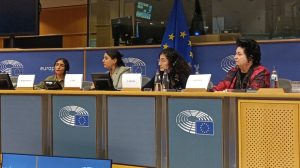
The first session of the conference was titled “Recognition of the genocide and the resulting consequences and obligations”.
Feleknas Uca, who moderated the panel, stated that they would listen to the witnesses of the genocide and hear from them what the Yazidis went through.
‘THEY ATTACKED WITH THE SUPPORT OF THE TURKISH STATE AND THE KDP’
Suad Murad Khalaf (Hêza), contemporary witness of the 74th genocide of the Yazidis in 2014, pointed out that the KDP forces withdrew when the genocide attacks started and added, “All this was planned.”
Remarking that ISIS gangs attacked Shengal with the help of the Turkish state and the KDP, Xelef continued, “Shengal was sold before the genocide. Our weapons were collected before the attack so that Yazidis could not protect themselves. Thousands of people were massacred apart from those kidnapped. Children and elderly people lost their lives.” Suad Murad Khalaf, as a witness to the brutality against Yazidi women, talked about the women who were sold in chains in the markets. Khalaf, who was one of the women sold, said “There were also those who protected the Yazidi community” and noted that HPG (People’s Defense Forces) and YPJ (Women’s Defense Units) forces rushed to help them. Khalaf said that she escaped after a year in the hands of ISIS and joined the defence forces, adding that the defence of Shengal is secured by Yazidis themselves today. Khalaf stated that the recognition of the genocide by many countries is important, but the threat of genocide continues, drawing attention to the attacks of the occupying Turkish state and calling for Turkish aggression to be prevented.
POST-GENOCIDE OBLIGATIONS
Rojda Arslan, a lawyer and consultant for international criminal law and human rights, made a presentation on the recognition of genocide under international law and at the political level. Arslan emphasised the obligations of European countries after the recognition of the Yazidi genocide and said, “They have two duties: Prosecuting the perpetrators of genocide and preventing a new genocide”. Rojda Arslan stated that there are trials and convictions in Germany on charges of genocide and noted that there are ISIS members who come from 80 different countries. Arslan said, “Courts face difficulties, they do not make an assessment with a single government. There is no coordination for the examination of these crimes, collection of evidence and judgement. This is a long-term process.”
‘EUROPE SHOULD TAKE STEPS’
Referring to the second obligation, which is to prevent genocide, Rojda Arslan stated that the threat continues today as thousands of Yazidis still living in the camps are defenceless and thousands of people are missing, which means that the ferman continues. Ferman is the term the Yazidis use to refer to the massacres and extermination operations in their history. While in Ottoman usage the term stands for a decree of the Sultan, in the Yazidi community the word took on the denotation of persecutions and pogroms. The genocide and femicide that began with the rout of the KDP peshmerga and the ISIS invasion of Shengal on 3 August was the 74th ferman in Yazidi history. Arslan added, “In order to prevent another genocide, European states that recognised the genocide should take steps to protect the Yazidi community.
‘COUNTRIES SUPPORTING ISIS MUST BE HELD ACCOUNTABLE’
“We need a feminist politics now,” said Marion Böker, Director of Advice for Human Rights and Gender Issues: War Crimes Against Women and International Responsibility. Marion Böker said that women should be listened to and pointed out that ISIS, Al-Qaeda and similar gangs are misogynists and that they also have relations with other states. “The states that support and arm these terrorists must also be held accountable,” Marion Böker said, emphasising that “the perpetrators of genocide, whether against women or a group, must be prosecuted. Marion Böker added that Europe should listen to the Yazidis for the recognition of the status of Shengal and its reconstruction.
‘AIRSPACE IN SHENGAL AND ROJAVA SHOULD BE CLOSED’
Marion Böker said that after the recognition of the genocide, the European Union and its countries should fulfil their obligations and action should be taken for the Yazidis in the same way as it was taken for Ukraine. Böker also called for compensation for the survivors of the genocide and said, “In this way, they can build a future for themselves and protect it. The EU and the United Nations should close the airspace of not only Shengal but also of northern and eastern Syria to Turkish warplanes. The status of Shengal should also be recognised.”
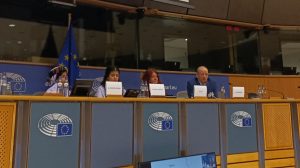
In the last session the focus was on reconstruction of Shengal and the recognition of its self-government.
In the session moderated by Shilan Badal Kheder, the first presentation was made by Suham Dexîl Reşo, spokesperson of the Diplomatic Committee of the TAJÊ (Yazidi Women’s Freedom Movement). She noted that the Yazidi people have been through 74 fermans throughout their history. Ferman is the term the Yazidis use to refer to the massacres and extermination operations in their history. While in Ottoman usage the term stands for a decree of the Sultan, in the Yazidi community the word took on the denotation of persecutions and pogroms. The genocide and femicide that began with the rout of the KDP peshmerga and the ISIS invasion of Shengal on 3 August was the 74th ferman in Yazidi history. Calling for more countries to recognise the Yazidi genocide, Suham Dexîl Reşo said, “The genocide perpetrated against Yazidis in 2014 was also a femicide.”
Suham Dexîl Reşo said, “The Yazidi community must be protected from new genocides. Germany has also recognised the genocide, but recognition is not enough. Yazidis should be protected. However, they are not.”
ATTACKS OF THE TURKISH STATE MUST BE STOPPED
Suham Dexîl Reşo stated that after the ISIS genocide in Shengal, the Turkish state started to attack the Yazidi town and not a year has passed without an attack since. “This reality should be seen when talking about the protection of the Yazidis. These attacks must be stopped in order to protect the Yazidis”. Reşo called especially for Germany to stop arms sales to the Turkish state. Pointing to the agreement concluded between the Erbil and Baghdad governments against Shengal, Suham Dexîl Reşo underlined that the decisions taken regarding the Yazidis should be taken in consultation with the Yazidi people. She criticised the fact that the Erbil-Baghdad agreement does not recognise the will of the Shengal people, adding: “The Yazidi people want this agreement to be cancelled.”
Suham Dexîl Reşo stated that it is not possible to develop a solution as long as the attacks of the Turkish state continue, underlining that another issue is reconstruction, “Today there is a model in Shengal, which embraces all the peoples in the region. After 74 fermans, it is the right of Yazidis to defend themselves and to be autonomous. This is a legitimate right. Self-defence is a right for the Yazidi people and all peoples.”
THREAT OF GENOCIDE CONTINUES
Pointing out that the threat of genocide continues besides the attacks of the Turkish state, Suham Dexîl Reşo said that the genocidal onslaught in 2014 was a planned aggression and that ISIS continues to exist in Iraq, especially in the Anbar region close to Shengal. Suham Dexîl Reşo remarked that the threat of genocide continues and added, “ISIS gangs and their collaborators should be prosecuted and held to account. The establishment of an international court to this end is important and necessary.” Reşo called for international steps to be taken for those who were kidnapped by ISIS and whose fate is still unknown, and for mechanisms to be established to find them.
CALL FOR FREEDOM FOR ABDULLAH ÖCALAN
Suham Dexîl Reşo also recalled Kurdish People’s Leader Abdullah Öcalan’s appeal for the protection of the Yazidi community and the intervention of freedom fighters to rescue the Yazidis from genocide when ISIS attacked. Reşo denounced the isolation of Abdullah Öcalan, who has not been heard from for nearly three years, and called for participation in the global campaign for the freedom of the Kurdish leader.
THE BIGGEST THREAT IS THE TURKISH STATE
Scientist and journalist Dr. Rassmann gave information about the geographical location of Shengal in a presentation titled “Shengal – A so-called disputed region.” Providing details about the region and its strategic importance on maps, Dr. Rassmann remarked that the Turkish state poses the biggest threat among the neighbouring countries. Rassmann pointed to Turkey’s undisguised expansionist policies and said: “Turkey wants to take Mosul and Kirkuk. In addition, the Turkish state pursues a hostile policy against the Kurds.”
THE SOLUTION LIES IN THE RECOGNITION OF SHENGAL’S AUTONOMY
Dr. Rassmann said that the Turkish state is constantly bombarding and intensively using drones and said, “In this way, civilian life is made difficult. Pointing out that the Turkish state also conducts intelligence activities in the region and threatens the people, Rassmann said: “The presence of drones is a terrorist activity. The people are terrorized.” Defining the never-ending Turkish attacks as “extrajudicial executions” and “de facto execution”, Dr. Rassmann emphasised that “They want to depopulate the region”. Dr Rassmann concluded by emphasising that the solution lies in the recognition of the autonomy of Shengal.
The last speaker of the session, Dr Mechthild Exo, made a presentation titled “The democratic nation as a future model and solution for Shengal and the region”. Mechthild Exo said, “Autonomy is a peaceful future and a solution for the Shengal region.” Mechthild Exo shared information about the organisation and life in Shengal, saying “Shengal today is protected by the Yazidi youth, and women play a fundamental role in all institutions.” Mechthild Exo underlined that this is a very important process and drew attention to the attacks of the Turkish state, saying that although there is talk of 74 fermans against the Yazidis, the attacks against them continue. Mechthild Exo also talked about the concept of democratic nation and said, “The nation state and related powers constitute a problem, especially in the Middle East. In the democratic nation model, there is no organisation as a state. Society takes its place in the organisation with its own free will. In Shengal, the democratic nation is no longer just being discussed, it is being implemented.” Mechthild Exo said that the model in Shengal can be expanded and applied to other regions of Iraq as a solution, emphasising that the attacks of the Turkish state can be prevented in this way.
Yazidi women’s conference ends with calls to the international community
The conference ended with the listing of a number of demands and recommendations for action to the international community. The 15-point final declaration lists the following topics, among others:
Prosecute those responsible for the genocide
The conference called on international organizations, in particular the United Nations and the International War Crimes Tribunal in The Hague, to investigate the statements contained in its report. The UN, the European Parliament and many national parliaments have recognized the atrocities committed in Shengal as genocide, and other parliaments and international organizations should join in. “We also demand that states and institutions that recognize the genocide take measures to prosecute those responsible. International efforts should be made to free the thousands of Yazidi women and children still held by ISIS.
Allow return to Shengal
The Yazidis who fled in 2014 must be allowed to return to Shengal. The KDP must be asked not to further complicate the return of people. The repair of the war damage and the reconstruction of Shengal need international support.
Legal prosecution of state support for ISIS
The support of ISIS by states such as Turkey in particular is not being prosecuted legally. This is not only shameful, but also paves the way for new massacres. Great importance is attached to the Yazidi Justice Committee (YJC) report entitled “State Responsibility and the Yazidi Genocide” published in July 2022.
Stop Turkish attacks
The countries that have recognized the genocide against the Yazidi community must use political, diplomatic and legal means to stop Turkey’s attacks on the Shengal region. The airspace must be closed to military air traffic.
Cancellation of the Shengal Agreement
The UN, the Iraqi government and the European Parliament should view the Shengal Agreement signed on 9 October 2020 as a concept for a continuation of the genocide and femicide against the Yazidis and annul it. The Yazidi organizations and institutions in Shengal must be involved in all decisions.
Searching for missing women
The conference called on UN Women and the European Union Commission on Women to identify Yazidi women and girls through special investigations in the countries where they are trafficked and to take legal action on this issue.
3 August should be designated femicide day
The conference called on the European Parliament to designate 3 August as feminicide day to prevent massacres against women from being included in geostrategic and geopolitical calculations in the future.
